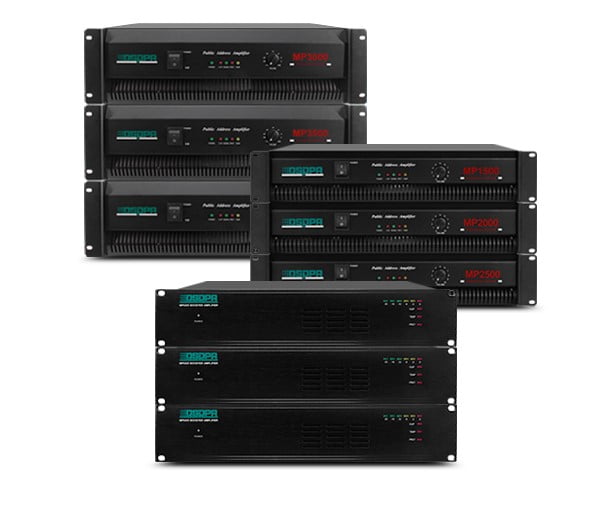
Welcome to PA Sound System Dubai, your go-to hub for top-notch audio gear in Dubai. From speakers to cables and amplifiers, find everything you need for superior sound experiences. Elevate your audio game with us today.
Selecting the right amplifier for your speakers is crucial to achieving the best audio performance. The right amplifier can bring out the full potential of your speakers, providing clarity, power, and quality. However, with so many options available, choosing the right amplifier can be challenging. This guide will help you understand the key factors to consider when selecting an amplifier and highlight some top products available at PA Sound System Dubai.
Understanding Amplifier Basics
What is an Amplifier?
An amplifier is a device that increases the power of an audio signal, allowing it to drive speakers and produce sound at higher volumes. Amplifiers are essential components in audio systems, whether for home theaters, professional sound systems, or personal audio setups.
Types of Amplifiers
- Integrated Amplifiers: Combine a preamplifier and a power amplifier in one unit, simplifying setup and saving space.
- Power Amplifiers: Dedicated units that provide the power needed to drive speakers, typically used in larger audio setups.
- Preamplifiers: Process the audio signal before it reaches the power amplifier, offering control over volume, tone, and other aspects.
- Digital Amplifiers: Use digital signal processing to provide efficient power amplification with reduced heat output.
Key Factors to Consider When Choosing an Amplifier
1. Power Output
The power output of an amplifier, measured in watts, determines how much power it can deliver to your speakers. It’s crucial to match the amplifier’s power output with the speaker’s power handling capacity to avoid damage and achieve optimal performance.
Example: MP120UB 120W Mini Digital Mixer Amplifier
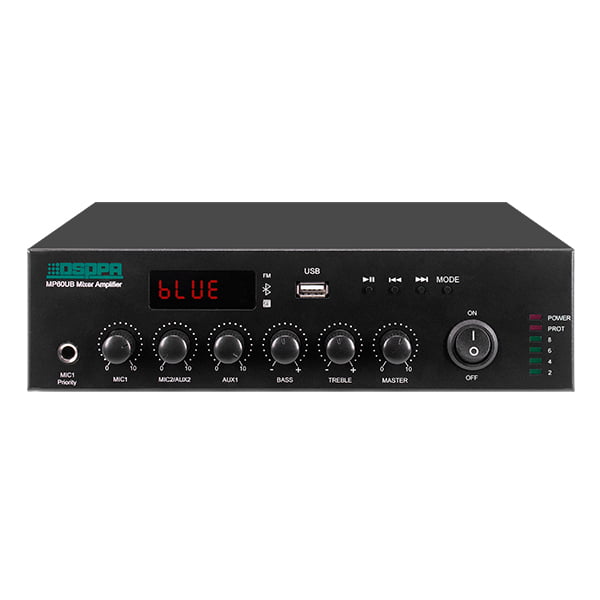
- Price: 850.00 د.إ
- Features: 120W power output, digital mixer, compact design.
2. Impedance Matching
Impedance, measured in ohms, is the resistance a speaker offers to the electrical signal from the amplifier. Ensure that the amplifier’s impedance rating matches that of your speakers to maintain sound quality and system efficiency.
3. Amplifier Class
Amplifiers are classified into different types based on their design and efficiency:
- Class A: High audio fidelity but lower efficiency.
- Class B: More efficient but can introduce distortion.
- Class AB: A compromise between Class A and Class B, offering good efficiency and audio quality.
- Class D: Highly efficient and compact, ideal for portable and modern audio systems.
4. Features and Connectivity
Consider the features and connectivity options you need, such as:
- Bluetooth and USB Support: For wireless streaming and easy connectivity with modern devices.
- Multiple Input/Output Options: To connect various audio sources and speakers.
- Equalization Controls: For fine-tuning the audio output to your preference.
Example: MP250UB 250W Mini Digital Mixer Amplifier with USB & Bluetooth
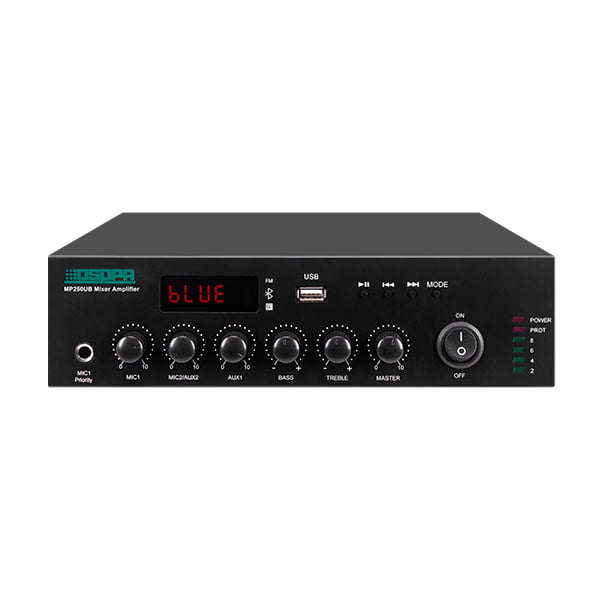
- Price: 1,200.00 د.إ
- Features: 250W power output, USB and Bluetooth connectivity, digital mixer.
5. Size and Design
The physical size and design of the amplifier should fit your space and aesthetic preferences. Compact and ultra-thin models are ideal for modern setups with limited space.
Example: MP60 60W Ultrathin Mixer Amplifier
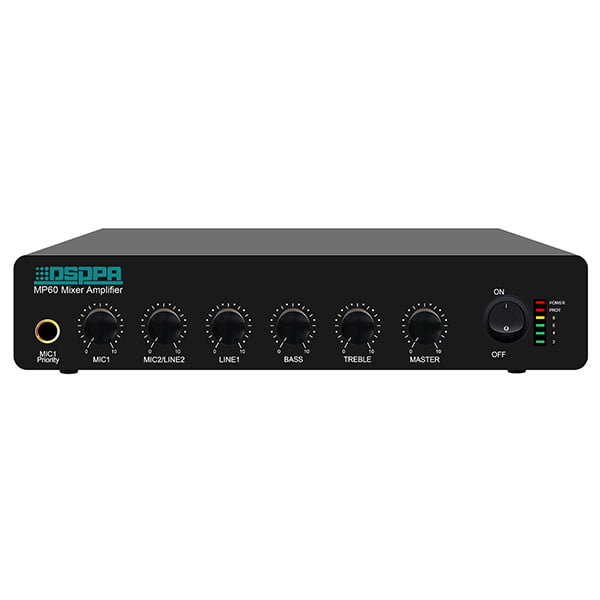
- Price: 850.00 د.إ
- Features: 60W power output, ultra-thin design, easy integration into any setup.
Choosing the Right Amplifier: Step-by-Step Guide
Step 1: Assess Your Audio Needs
Determine the primary use of your audio system, whether for home theater, music listening, or professional use. This will help you decide on the necessary power output and features.
Step 2: Check Your Speaker Specifications
Review the specifications of your speakers, including power handling capacity (watts) and impedance (ohms). Match these specifications with the amplifier to ensure compatibility.
Step 3: Decide on Additional Features
Identify any additional features you may need, such as wireless connectivity, multiple input options, or equalization controls. This will help you narrow down your options.
Step 4: Set Your Budget
Establish a budget based on your needs and the features you require. Amplifiers range in price, so having a clear budget will help you make an informed decision.
Step 5: Compare Products
Compare different amplifiers within your budget, considering their specifications, features, and user reviews. Here are some products available at PA Sound System Dubai to consider:
Example: MP9306U 60W Ultra-thin Digital Mixer Amplifier
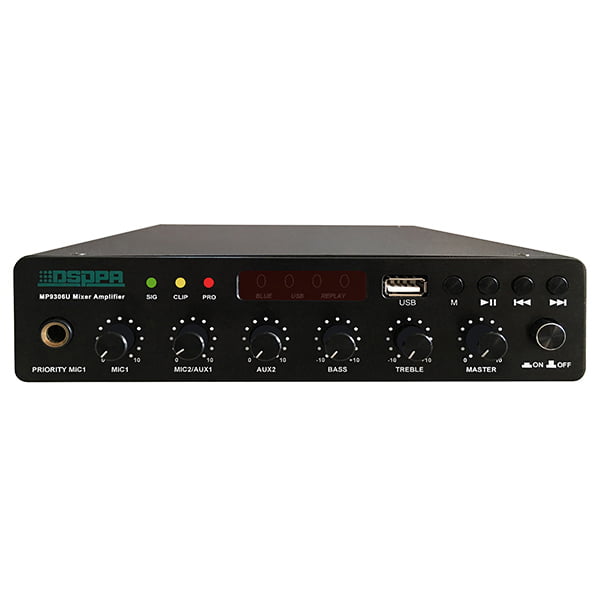
- Price: 900.00 د.إ
- Features: 60W power output, ultra-thin design, digital mixer.
Example: MP9312U 120W Ultra-thin Digital Mixer Amplifier
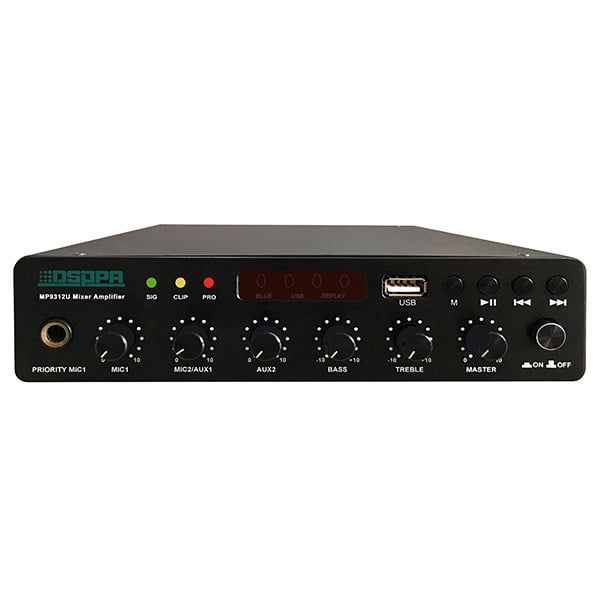
- Price: 900.00 د.إ
- Features: 120W power output, ultra-thin design, digital mixer.
Amplifier and Speaker Matching: Practical Examples
Scenario 1: Home Theater System
For a home theater system, you might require an amplifier with higher power output and multiple channels to drive various speakers, including subwoofers, surround speakers, and center channels. An example setup could include the MP250UB 250W Mini Digital Mixer Amplifier with USB & Bluetooth for its high power output and modern connectivity options.
Scenario 2: Small Room Music Listening
In a smaller room where space is limited, an ultra-thin amplifier like the MP60 60W Ultrathin Mixer Amplifier can provide adequate power and fit seamlessly into the room’s aesthetic.
Scenario 3: Professional Audio Setup
For professional audio setups, such as in a studio or for live events, you might need multiple amplifiers to drive different speaker configurations. The MP9312U 120W Ultra-thin Digital Mixer Amplifier can be a part of a larger, more complex setup, providing reliable performance and high-quality sound.
Common Mistakes to Avoid When Choosing an Amplifier
1. Overlooking Impedance Matching
Failing to match the impedance of your amplifier and speakers can result in poor audio quality and potential damage to your equipment.
2. Ignoring Power Requirements
Choosing an amplifier with insufficient power can lead to distorted sound and potential speaker damage. Ensure the amplifier’s power output matches or exceeds the speaker’s power handling capacity.
3. Not Considering Future Upgrades
Select an amplifier that supports potential future upgrades. This includes additional connectivity options, extra channels, and compatibility with modern audio technologies.
4. Focusing Solely on Price
While budget is important, focusing solely on the cheapest option can lead to poor performance and dissatisfaction. Balance cost with quality and features to get the best value for your investment.
5. Neglecting Professional Advice
Consulting with audio professionals can provide valuable insights and recommendations tailored to your specific needs. At PA Sound System Dubai, our experts are available to help you make the best choice.
Conclusion: Making an Informed Decision
Choosing the right amplifier for your speakers is crucial for achieving optimal audio performance. By understanding the key factors to consider and following a systematic approach, you can find an amplifier that meets your needs and enhances your audio experience. Whether you’re setting up a home theater, a music listening space, or a professional audio system, PA Sound System Dubai offers a wide range of amplifiers to suit every requirement and budget.
Contact Us
Ready to choose the perfect amplifier for your speakers? Contact PA Sound System Dubai today to learn more about our products and services. Our team is here to assist you in finding the ideal amplifier to elevate your audio experience. Visit: https://pasoundsystemdubai.com/contact-us/
Frequently Asked Questions
What is the most important factor when choosing an amplifier for speakers?
The most important factor is ensuring that the amplifier’s power output matches the speaker’s power handling capacity. This measure safeguards against harm, guaranteeing peak efficiency.
Can I use a digital amplifier for my home theater system?
Yes, digital amplifiers are highly efficient and can be an excellent choice for home theater systems. They offer modern features like Bluetooth and USB connectivity.
Do I need a separate preamplifier for my audio setup?
It depends on your setup. Integrated amplifiers combine a preamplifier and a power amplifier, simplifying the setup. However, for more complex or professional setups, a separate preamplifier might be beneficial.
How do I know if my amplifier and speakers are compatible?
Check the impedance and power handling specifications of both the amplifier and the speakers. They should match to ensure compatibility and prevent damage.
Is professional installation necessary for amplifiers?
Professional installation is not always necessary, but it can ensure optimal performance and proper setup, especially for complex or high-end audio systems
